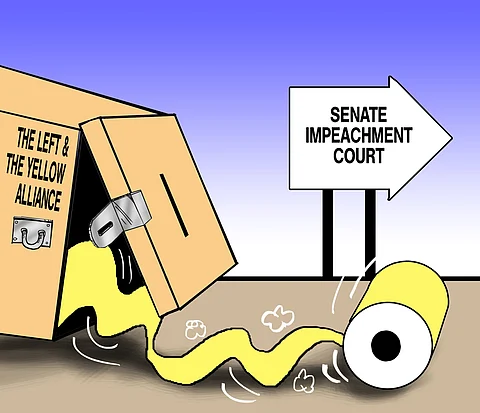
- NEWS
- the EDIT
- COMMENTARY
- BUSINESS
- LIFE
- SHOW
- ACTION
- GLOBAL GOALS
- SNAPS
- DYARYO TIRADA
- MORE

The administration of President Ferdinand Marcos Jr. and his legacy will absorb the most significant impact from the impeachment trial of Vice President Sara Duterte, based on the yellow mob strategy that is playing out.
A fractured landscape was the target from the start, an effort that would be cloaked in the guise of a supposed search for accountability.
Senate President Francis “Chiz” Escudero in his defense of the Senate impeachment timetable exposed the House of Representatives, bolstered by the communist front legislators, as having delayed the impeachment proceedings by sitting on the transmission of the Articles of Impeachment to the Senate.
The House members were trying to juice the proceedings then for publicity and propaganda that backfired. Most of the noisemakers crashed miserably in the midterm polls.
None of the 12 Makabayan bloc bets were among the top 30 senatorial candidates. Yet, they were able to influence the flow of the House impeachment process, as those behind it were trying to distance themselves from the divisive effort.
Allowing the alliance of the left and the yellow to set the pace was a huge blunder for the traditional politicians (trapos) in the House, as opportunists were waiting for the chance to take control.
The yellow revival was thus sowed in the House probes of the Dutertes, specifically those conducted by the Makabayan-spearheaded quad committee investigations.
The impeachment of VP Duterte stems from allegations of serious offenses, including the misuse of confidential funds of P125 million allocated to the Office of the Vice President in 2022 and P112.5 million to the Department of Education in 2023, where she served as secretary. Unexplained wealth, conspiracy to commit murder, and betrayal of public trust were also alleged.
Based on Escudero’s timeline, the House delayed the impeachment complaints against VP Duterte for over two months before formally endorsing and transmitting them to the Senate on 5 February 2025.
The Senate’s role in an impeachment process begins only after receiving the Articles of Impeachment from the House.
According to Escudero, the Senate remained silent on the delay out of respect for inter-parliamentary courtesy and did not interfere with the House’s handling of the complaints.
The Senate schedule should not be dictated by the House’s timeline or expectations for the impeachment trial, Escudero insisted, adding that the Senate has its own schedule and constitutional mandate.
The House transmitted the Articles of Impeachment before Congress went on a break, constraining the Senate’s ability to act immediately.
Escudero said the Senate could not legally commence the trial during the election break, as the process requires the chamber to convene as an impeachment court, which had not been done before the adjournment.
Schemers at the House then seized on the delay as being intentional and blamed it on the Senate President.
Escudero was accused of delaying the trial to protect Duterte or to secure his position as Senate President in the 20th Congress.
Procedural requirements of the Senate stipulate that the impeachment documents can only be addressed when the session resumes on 2 June.
The reading of the Articles of Impeachment was moved to 11 June to prioritize the passage of 12 pending bills of the administration.
The Senate leader pointed out that the House’s delay in acting on the complaints for over two months significantly contributed to the tight timeline, as the 19th Congress was set to adjourn sine die on 13 June and end on 30 June.
The groups pressuring the Senate to start the trial were those behind the two extra-constitutional power grabs of 1986 and 2001 who branded the Senate’s “deliberate delay” as an obstruction of the constitutional process.
None of these groups care about the rule of law or constitutional processes, having short-circuited the popular will twice already and now seeking to do it again.
